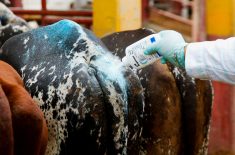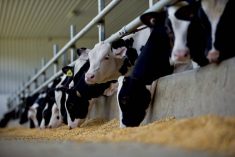Canadian pork shippers will comply with Russia’s new zero-tolerance requirement for the feed additive ractopamine in meat shipments, Canada Pork International said Wednesday.
In a letter to Russia’s Federal Service for Veterinary and Phytosanitary Surveillance (VPSS), the industry group said that, as of Dec. 7, all Canadian pork exports destined for Russia are being tested to ensure they are free of ractopamine.
Russia is Canada’s second-biggest pork export market in volume.
The tests are being conducted at one of three laboratories certified by the Canadian Food Inspection Agency (CFIA). The government agency’s export certificates now must be accompanied by lab tests negative for ractopamine, Jacques Pomerleau, executive director of Canada Pork International, told Reuters in an interview.
Read Also

Mexico agriculture secretary says still no date for restarting cattle exports to U.S.
Mexican Agriculture Minister Julio Berdegue said on Wednesday that Mexico and the United States have not yet set a date to resume Mexican cattle exports amid an outbreak of the flesh-eating screwworm parasite.
"Since the Russians are requiring those tests, it’s up to the companies to have the product tested and the results must be provided to CFIA so they can attach it to the certificates," he said. "We need to comply with the Russian requirement. Russia is a very big market for Canada."
Canada Pork sent the letter to VPSS to clarify the shippers’ position — that there is a strong consensus to comply with the requirement, he said.
The CFIA itself has not changed its own procedures and tests for meat exports to Russia, Pomerleau confirmed. Last week, Agriculture Minister Gerry Ritz said the government had made no change and had told Russia that Canada does not think its new requirement is based on science.
"Canadian officials, in contrast to Canadian business, have yet to express willingness to adhere to the requirements of Russia and the Customs Union to abandon the use of synthetic growth stimulators in the production of goods exported to Customs Union countries," the VPSS said in a statement.
U.S. trade and agriculture authorities have taken a stand against Russia’s sudden decision to require that meat imports be documented as free of ractopamine.
A U.S. trade official said the United States remains "very concerned that Russia has taken these actions, which appear to be inconsistent with its obligations as a member of the World Trade Organization.
"We continue to call on Russia to suspend these measures and restore market access for U.S. beef and pork products."
There has not been any noticeable reduction in shipments of Canadian pork to Russia since Dec. 7, and December is typically a slow period, Pomerleau said.
The Canadian pork industry is also working on new protocols to demonstrate that Canadian pork shipments to Russia were derived from pigs who were not raised with the drug, which is used to make meat leaner.
"No beef exports"
Canada has shipped virtually no beef to Russia since it imposed the new rule on ractopamine, said John Masswohl, director of government and international relations for the Canadian Cattlemen’s Association.
Masswohl said he’s aware of only two major Canadian processing facilities – both owned by Cargill Ltd – that are currently eligible to ship beef to Russia.
"Cargill, the way I understand it, has made a decision not to risk exporting to Russia as a result" of the ractopamine requirement, Masswohl said. "In essence, we have no beef exports to Russia."
Cargill could not be reached for comment.
Russia is a significant high-end market for Canadian steaks, but not one of Canada’s biggest beef customers in overall volume.
Ractopamine, approved for use in Canada since 2006, is sold to Canadian users by U.S. animal health giant Elanco, under the name Paylean 20 premix for hogs and heavy tom turkeys, and as Optaflexx 100 premix for finishing beef cattle.
— Rod Nickel and Melissa Akin write for Reuters from Winnipeg and Moscow respectively.











